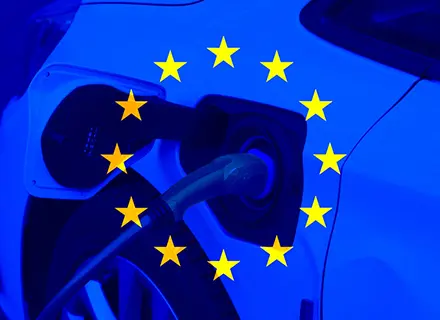Italy PM Giorgia Meloni has denounced as “self-destructive” the European Union’s (EU) decision to stop selling new fossil fuel-powered automobile engines after 2035 and promised to put pressure on Brussels “to reverse these mistakes.”
Speaking to the influential Italian business group Confindustria recently, the Prime Minister referred to the “forced conversion” of the whole EU market for new light vehicle sales to electric propulsion within ten years as “not very wise as a plan.”
Giorgia Meloni denounced the “disastrous effects” of the European “Green Deal” and its “ideological approach,” saying that “the green transition cannot mean losing thousands of jobs, or demolishing entire industrial segments that provide wealth and employment.”
Her harsh criticism comes as calls for an early, urgent review of the European Union’s automobile pollution regulations, which effectively equate to a prohibition on the sale of new combustion engines by 2035, are intensifying from Italy, Germany, and certain eastern European nations like the Czech Republic, which produce vehicle components.
Adopted in 2023, the regulations represent one of the most contentious aspects of the bloc’s ambitious Green Deal climate policy. Automakers and the governments of countries that produce cars are requesting a postponement of the prohibition or additional latitude in the regulations, including allowances for using carbon-neutral e-fuels.
The liberal Free Democratic Party member Volker Wissing, Germany’s transport minister, warned at a transportation industry trade show this week that “Europe is losing credibility because it is setting targets that it can’t even meet itself.”
While acknowledging the importance of goals, Wissing suggested they should be reasonable and “possible to implement in practice.”
Conservative parliamentarians, including those from Ursula von der Leyen’s own European People’s Party, have asked Brussels to reconsider the restriction when it comes up for revision in 2026.
Italy is even attempting to move up the review process to the following year, citing a worsening crisis in its auto industry due to a decline in production and consumer demand for electric cars.
The number of passenger cars produced in Italy in the first seven months of 2024 was merely 225.000, a decrease of 35.5% from the same period the previous year, according to the National Auto Industry Supply Chain Association, which represents the country’s auto and component manufacturers.
“The Green Deal in its original form has not succeeded,” Italian Industry Minister Adolfo Urso declared at a recent business gathering, as he added, “The car industry in Europe is crumbling. We cannot wait another two years to make decisions.”
The historic plant in Turin, home of Stellantis, the worldwide corporation that owns the Fiat brand and is the largest automaker in Italy, will be temporarily suspending production of electric Fiat 500s due to low demand.
Rather than dictating a mandatory transition to electric vehicles, Giorgia Meloni contended in her speech to the business community that the EU ought to have adhered to the concept of technological neutrality, letting each member state determine its strategies for reducing CO2 emissions.
In support of her claim that “we do not own the raw materials and do not control the value chain” for EVs, she stated, “We want to safeguard European industrial capacity.”
Giorgia Meloni declared, “I promise to keep working hard to make these corrections. With common sense, we want to reduce polluting emissions and utilise all available technology to do so, potentially saving tens of thousands of jobs along the way.”
In an interview with the Financial Times, Teresa Ribera, the European Union’s likely next executive vice president in charge of green policy, claimed that the establishment of the 2035 phaseout date for combustion engines had provided the European auto industry with the “stability and reliability” required to develop the electric vehicle ecosystem.
In September 2024, the automotive trade association ACEA released a presentation stating that, in 2023, “EU car sales grew for the first time since 2019 with battery-electric cars virtually double their market share.”
However, the latest sales numbers now cast a shadow on the continent’s EV dreams. New car sales in the European Union fell 18.3% in August to their lowest in three years, dragged by double-digit losses in major markets Germany, France and Italy.
Sales of fully electric cars slumped 43.9% in August, falling for the fourth consecutive month, as the bloc’s biggest electric vehicle markets Germany and France recorded drops of 68.8% and 33.1% respectively, the European Automobile Manufacturers Association (ACEA) said.
Car sales in Europe have now dropped well below pre-COVID-19 levels, with carmakers such as Volkswagen warning that the trend might not change in the foreseeable future. EV sales growth too has slowed, in part due to diverging policies on green incentives, while regulators have imposed hefty tariffs to try to keep cheap Chinese cars from flooding the continent’s markets.
Sales of battery electric and plug-in cars fell by 43.9% and 22.3% respectively in August, while those of hybrid-electric cars rose 6.6% to a market share of 31.3%. Registrations at Europe’s three largest carmakers Volkswagen, Stellantis and Renault all fell from a year earlier, by 14.8%, 29.5% and 13.9%, respectively. Sales at Tesla (TSLA.O), dropped 43.2%, and those for China’s SAIC Motor were down 27.5%.
The market share of hybrid electric cars has increased in the European Union in recent months, as buyers see them as an affordable compromise between all-combustion and all-electric.
To inject new stimulus into the market, Germany agreed in September 2024 on tax deductions of up to 40% for companies on their sales of electric cars, after a 2023 campaign ending a subsidy programme designed to help speed up the green transition.

